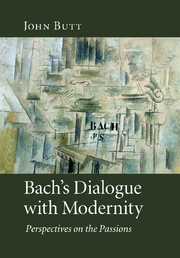Book contents
- Frontmatter
- Contents
- Preface
- List of abbreviations
- Introduction
- 1 Bach's Passions and the construction of early modern subjectivities
- 2 Bach's Passions and the textures of time
- 3 The hermeneutic perspective – negotiating the poles of faith and suspicion
- 4 The voices we hear and the construction of narrative authority
- 5 Between rhetoric and dialectic – Bach's inventive stance
- Afterword
- Appendix
- Bibliography
- Index
1 - Bach's Passions and the construction of early modern subjectivities
Published online by Cambridge University Press: 26 February 2010
- Frontmatter
- Contents
- Preface
- List of abbreviations
- Introduction
- 1 Bach's Passions and the construction of early modern subjectivities
- 2 Bach's Passions and the textures of time
- 3 The hermeneutic perspective – negotiating the poles of faith and suspicion
- 4 The voices we hear and the construction of narrative authority
- 5 Between rhetoric and dialectic – Bach's inventive stance
- Afterword
- Appendix
- Bibliography
- Index
Summary
It is my thesis in this chapter that one of the factors that has rendered the Matthew Passion so successful over the course of its reception lies in its evocation of subjectivities that somehow resonate with those of the broader modern condition. Some define the modern age itself as one that is marked by a new type of subjectivity characterized by individualism and autonomy of action. I would suggest that modern forms of subjectivity are among the most crucial elements conditioning musical works of the Classic-Romantic tradition, which might embody, represent or suggest particular ways of conceiving the self. Perhaps, given the difference in their respective receptions, the forms of subjectivity evoked in the Matthew Passion are more ‘modern’ than those of the John Passion. But, if the John Passion relates to different forms of subjectivity (or none at all), this may well be significant in relation to the work's increased prestige during the course of the twentieth century. If we are indeed now living in an era when the hold of the stronger, Romantic musical work concept is loosening, there might be some pertinent parallels between the cultural issues of Bach's era and our own: in his, the stronger concept was emerging, in ours it is dispersing (or at least diversifying).
The term ‘subjectivity’ embraces much more than the popular definition of it as representing a personal, characteristically biased and ‘non-objective’ view.
- Type
- Chapter
- Information
- Bach's Dialogue with ModernityPerspectives on the Passions, pp. 36 - 96Publisher: Cambridge University PressPrint publication year: 2010
- 1
- Cited by

